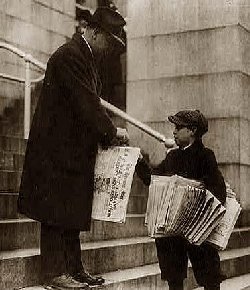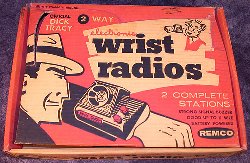- Where should the buck stop?
 Have you ever noticed how people try to make their problems yours? Let me give you an example, we have a small garbage dumpster next to our office building and other people began using it to dump their trash as soon as we installed it. Of course, we then put a lock on it but this didn't seem to deter a few people who put their trash on top of the dumpster. We even had one instance where someone deposited an old sofa on the dumpster which caused me to pay the garbage man a little extra to dispose of it. In other words, people transferred their problems to me.
Have you ever noticed how people try to make their problems yours? Let me give you an example, we have a small garbage dumpster next to our office building and other people began using it to dump their trash as soon as we installed it. Of course, we then put a lock on it but this didn't seem to deter a few people who put their trash on top of the dumpster. We even had one instance where someone deposited an old sofa on the dumpster which caused me to pay the garbage man a little extra to dispose of it. In other words, people transferred their problems to me.
There seems to be a lot of this going on, particularly among Customer Service people. A lot of the service people I talk to seem to be more interested in compounding my problems as opposed to solving them. Nobody really likes to deal with problems, but if that's what you're getting paid to do I fail to see the rationale of complicating life as opposed to simplifying it.
You see this "pass the buck" mentality just about everywhere, not just in the office but at home as well. It has become so prevalent it's like a giant merry-go-round with everybody passing their problems on to someone else. Here's an idea; why not pull the plug on the ride and have everyone address their own problems, it's what we call "responsibility," something a lot of us cannot seem to accept.
As to our dumpster problem, we picked through a couple of bags of garbage that had been dropped off on us and found the name and address of the person who dumped it. We then dutifully returned the bags of trash to their rightful owner who was unhappy to see it returned. I think we need to see more of this type of action, instead of letting the buck stop on our doorstep, how about returning it to its rightful owner?
Keep the Faith!
Note: All trademarks both marked and unmarked belong to their respective companies.
 Tim Bryce is a writer and the Managing Director of M&JB Investment Company (M&JB) of Palm Harbor, Florida and has over 30 years of experience in the management consulting field. He can be reached at timb001@phmainstreet.com
Tim Bryce is a writer and the Managing Director of M&JB Investment Company (M&JB) of Palm Harbor, Florida and has over 30 years of experience in the management consulting field. He can be reached at timb001@phmainstreet.com
For Tim's columns, see:
timbryce.com
Like the article? TELL A FRIEND.
Copyright © 2013 by Tim Bryce. All rights reserved.
NEXT UP: MAKING YOUR PROBLEMS MINE - Where should the buck stop?
LAST TIME: DO NOT USE TRAVELOCITY! - Of course, if you can live without refunds and don't mind talking to India...
Listen to Tim on WJTN-AM (News Talk 1240) "The Town Square" with host John Siggins (Mon, Wed, Fri, 12:30-3:00pm Eastern), KGAB-AM 650 "The Morning Zone" with host Dave Chaffin (weekdays, 6:00-10:00am Mountain), and KIT-AM 1280 in Yakima, Washington
"The Morning News" with hosts Lance Tormey & Brian Teegarden (weekdays. 6:00-9:00am Pacific). Or tune-in to Tim's channel on YouTube.
Also look for Tim's postings in the Palm Harbor Patch, The Gentlemen's Association, and throughout the Internet.
 Not long ago I wrote about the perils of
Not long ago I wrote about the perils of  In business, there seems to be a growing change in the perspective regarding purchasing. I am finding more and more people attracted to vendors who simply offer the lowest price. This is fine if you are genuinely comparing apples to apples, but not apples to oranges. Price is one thing, "value" is something else, and something people commonly overlook these days. By "value" I'm including the services above and beyond the cost of the product. For example, warranty and maintenance.
In business, there seems to be a growing change in the perspective regarding purchasing. I am finding more and more people attracted to vendors who simply offer the lowest price. This is fine if you are genuinely comparing apples to apples, but not apples to oranges. Price is one thing, "value" is something else, and something people commonly overlook these days. By "value" I'm including the services above and beyond the cost of the product. For example, warranty and maintenance.
 Ever wonder what goes through people's heads? Or maybe you have heard yourself say, "What the hell are you thinking of?" It shouldn't come as a surprise to find a lot of people don't use their head during the day. A couple of years ago I wrote a paper entitled,
Ever wonder what goes through people's heads? Or maybe you have heard yourself say, "What the hell are you thinking of?" It shouldn't come as a surprise to find a lot of people don't use their head during the day. A couple of years ago I wrote a paper entitled,  Coming from the Information Technology industry, I understand the challenges of developing and implementing standards. Those introduced by companies seem to be more successful than those sanctioned by government. Either way, there seems to be a natural aversion to standards in this country. As a small example, consider the attitude of parents who steadfastly resist student uniforms in school, claiming it inhibits the creativity and individuality of their offspring.
Coming from the Information Technology industry, I understand the challenges of developing and implementing standards. Those introduced by companies seem to be more successful than those sanctioned by government. Either way, there seems to be a natural aversion to standards in this country. As a small example, consider the attitude of parents who steadfastly resist student uniforms in school, claiming it inhibits the creativity and individuality of their offspring.
 I recently returned from my summer vacation. Normally, I take time off in July as it seems just about everyone in my neck of the woods ducks out of town, thereby turning neighborhoods into ghost towns. This time I was fortunate to slip away to North Carolina with some old high school buddies to do some fly-fishing. When we weren't in the cold streams, we were sitting on the front porch of my friend's cabin swapping lies and tying flies. It was most enjoyable. Following this, I went up to Ohio with my wife to visit my in-laws.
I recently returned from my summer vacation. Normally, I take time off in July as it seems just about everyone in my neck of the woods ducks out of town, thereby turning neighborhoods into ghost towns. This time I was fortunate to slip away to North Carolina with some old high school buddies to do some fly-fishing. When we weren't in the cold streams, we were sitting on the front porch of my friend's cabin swapping lies and tying flies. It was most enjoyable. Following this, I went up to Ohio with my wife to visit my in-laws.
 I have always found the English language rather interesting, particular the words we use as well as the ones we do not in our vernacular; (see
I have always found the English language rather interesting, particular the words we use as well as the ones we do not in our vernacular; (see  Holidays such as Thanksgiving and Christmas typically bring members of the family together, as does family vacations and anniversaries. Inevitably, family members open their homes and share quarters with loved ones traveling from out of town. Perhaps you'll go home to see your parents and stay in your old room or stay with one of your siblings. Such close quarters are certainly appreciated, but they also have a tendency to drive people crazy, both the host and the guest, regardless how much we love our family.
Holidays such as Thanksgiving and Christmas typically bring members of the family together, as does family vacations and anniversaries. Inevitably, family members open their homes and share quarters with loved ones traveling from out of town. Perhaps you'll go home to see your parents and stay in your old room or stay with one of your siblings. Such close quarters are certainly appreciated, but they also have a tendency to drive people crazy, both the host and the guest, regardless how much we love our family.
 When I first started in the work force, I asked my boss about the scope of my responsibilities. He simply told me to go as far and hard as possible. If I started to wander out of bounds, he would reign me in. This worked remarkably well. I quickly discovered the boundaries of my job and which ones not to cross. Rarely do you find such companies anymore, even small businesses. The work place is now organized into small boxes which defines the duties and responsibilities of just about everything. Whether you are in business or participate in a nonprofit organization, there seems to be more of these "boxes of rules" emerging, and they are inhibiting our ability to get things done. I'm not sure where this mindset came from. I can only suspect unions, who only perform no more than what is inside the box, influence this type of thinking; government likewise.
When I first started in the work force, I asked my boss about the scope of my responsibilities. He simply told me to go as far and hard as possible. If I started to wander out of bounds, he would reign me in. This worked remarkably well. I quickly discovered the boundaries of my job and which ones not to cross. Rarely do you find such companies anymore, even small businesses. The work place is now organized into small boxes which defines the duties and responsibilities of just about everything. Whether you are in business or participate in a nonprofit organization, there seems to be more of these "boxes of rules" emerging, and they are inhibiting our ability to get things done. I'm not sure where this mindset came from. I can only suspect unions, who only perform no more than what is inside the box, influence this type of thinking; government likewise.
 During the 1952 classic movie,
During the 1952 classic movie,  I know eBooks have made substantial gains in terms of popularity, but having a hard copy can still be very beneficial. There are many people who like the touch and feel of paper versions. In the past, if you were an author, you had to sign a contract with a suitable printer or publisher who could put it all together for you. This usually meant you or your publisher had to maintain an inventory of books. If you had a best seller, you would simply reorder stock, but if it didn't, the books (and your cash) would sit on the shelf gathering dust.
I know eBooks have made substantial gains in terms of popularity, but having a hard copy can still be very beneficial. There are many people who like the touch and feel of paper versions. In the past, if you were an author, you had to sign a contract with a suitable printer or publisher who could put it all together for you. This usually meant you or your publisher had to maintain an inventory of books. If you had a best seller, you would simply reorder stock, but if it didn't, the books (and your cash) would sit on the shelf gathering dust.
 If you listen to members of the "Greatest Generation," those surviving the Great Depression and beyond, you hear stories of hunger, unemployment, desperation, sacrifice, and austerity. It was a point in our history when the middle class hit rock bottom. If you talk to people from this era though, they will also describe a time when the family pulled together and worked unselfishly to make ends meet. Families maintained vegetable gardens, canned fruit, raised chickens and rabbits, sewed and knitted, put cardboard in shoes to extend their life, walked to school, turned the heat down during the winter, and wasted nothing. Children sold newspapers and ran errands, some quit school prematurely in order to work to support the family, men sold apples, bottles were saved for their deposits, and everyone understood the value of a mere penny. To illustrate, when I was in Junior High School in Chicago, back in the 1960's, I remember an incident whereby my family was going out for dinner. My father was driving, and we had just left our driveway when my brother discovered four pennies in his pocket. Thinking the coins were nothing but junk, he rolled down his window and threw the pennies out into the street. When my father saw this in his rear view mirror, he slammed on the brakes, and barked at my brother to get out of the car and pick up every penny he had thrown out. Yes, my father, who grew up in the 1930's, understood the value of a penny, a lesson he taught not only my brother, but myself.
If you listen to members of the "Greatest Generation," those surviving the Great Depression and beyond, you hear stories of hunger, unemployment, desperation, sacrifice, and austerity. It was a point in our history when the middle class hit rock bottom. If you talk to people from this era though, they will also describe a time when the family pulled together and worked unselfishly to make ends meet. Families maintained vegetable gardens, canned fruit, raised chickens and rabbits, sewed and knitted, put cardboard in shoes to extend their life, walked to school, turned the heat down during the winter, and wasted nothing. Children sold newspapers and ran errands, some quit school prematurely in order to work to support the family, men sold apples, bottles were saved for their deposits, and everyone understood the value of a mere penny. To illustrate, when I was in Junior High School in Chicago, back in the 1960's, I remember an incident whereby my family was going out for dinner. My father was driving, and we had just left our driveway when my brother discovered four pennies in his pocket. Thinking the coins were nothing but junk, he rolled down his window and threw the pennies out into the street. When my father saw this in his rear view mirror, he slammed on the brakes, and barked at my brother to get out of the car and pick up every penny he had thrown out. Yes, my father, who grew up in the 1930's, understood the value of a penny, a lesson he taught not only my brother, but myself.
 My wristwatch recently broke and I had it taken in for repair. At first I kind of felt like a dog who had lost his collar, like an important part of me was missing. After awhile though, I got used to it and felt somewhat unshackled. I think the last time I was without a watch was back when I was in high school. Surprisingly, I discovered I didn't miss the watch that much and may go on without wearing one. I have no problem knowing the time as I can find it just about everywhere, including my PC, in my automobiles, on television and radio, and general wall clocks. Cell phones and other personal electronic devices also maintain the time. So much so, young people imbued with the new technologies are less likely to wear a watch than their elders.
My wristwatch recently broke and I had it taken in for repair. At first I kind of felt like a dog who had lost his collar, like an important part of me was missing. After awhile though, I got used to it and felt somewhat unshackled. I think the last time I was without a watch was back when I was in high school. Surprisingly, I discovered I didn't miss the watch that much and may go on without wearing one. I have no problem knowing the time as I can find it just about everywhere, including my PC, in my automobiles, on television and radio, and general wall clocks. Cell phones and other personal electronic devices also maintain the time. So much so, young people imbued with the new technologies are less likely to wear a watch than their elders.